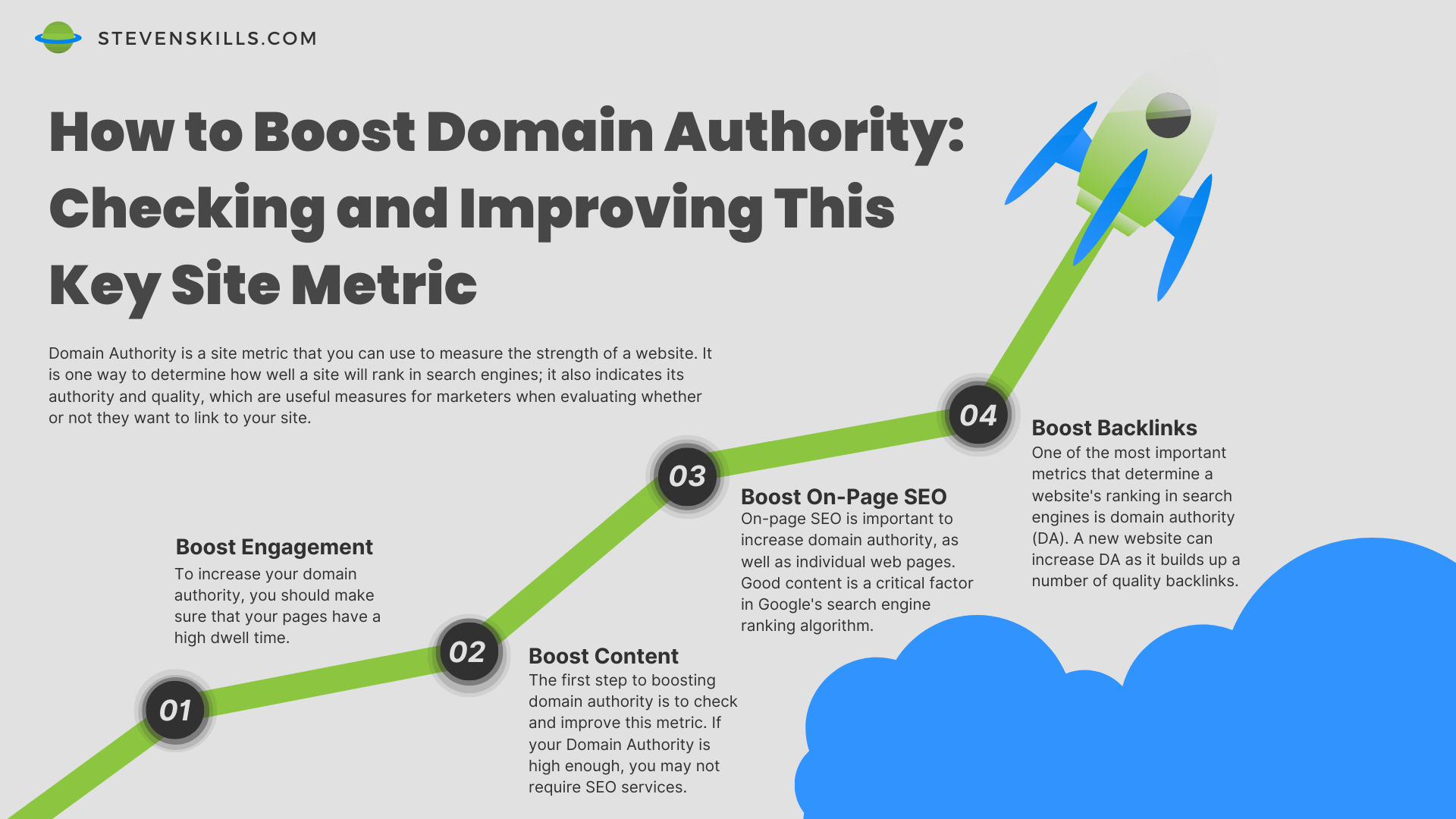Domain Authority

Introduction
You might think of domain authority as the online equivalent of your home address. Your street number helps you find your home and provides others with an easy way to find you. Similarly, domain authority is a web metric that tells search engines how important or valuable your website is. It's one of several factors that Google uses in its ranking algorithm (but they say it isn't), and it's becoming increasingly important as search engines continue to evolve and adapt their algorithms based on user behavior (including the behavior of spammers).
What is Domain Authority (DA)?
As you may have guessed from the name, domain authority is a measure of the overall link profile of a domain. Domain authority is a score that ranges from 1-100, with 100 representing the highest possible score and 1 being the lowest. Domain authority is calculated by Moz and can be found in your SEO toolkit when you log into your account.
This metric is important because it's another way to determine how likely it is that you will rank well in search engines based on where other sites are linking to yours.
Why does DA matter?
Domain Authority is a site metric that you can use to measure the strength of a website. It is one way to determine how well a site will rank in search engines; it also indicates its authority and quality, which are useful measures for marketers when evaluating whether or not they want to link to your site. This is why it's important to track your Domain Authority, as well as your link metrics and other SEO-related data. If you're using a tool like Moz, it will be easy for you to see how your site is performing over time and how it compares with other sites in your niche.
How to check Domain Authority
Domain Authority is an SEO metric that measures how well a website ranks in search engines. To check your DA, you can use this tool from Moz (a digital marketing agency). Just enter your domain name into the box and click on “Check Domain Authority”. Once you see the results, click on the table of results for more details about each ranking factor. You can sort these results by clicking on column headings like “Citation Flow” or “Trust Flow” to find out which factors are most important to improving your DA score
Domain Authority scores range from 0-100. A high Domain Authority score means that search engines see your website as an authoritative source for information about its topic. Increasing Domain Authority is important because it can lead to better rankings in search engines and more traffic, which can translate into more sales. https://moz.com/domain-analysis
What is a Good Domain Authority Score?
A good DA score is between 40 and 80. If it's below that range, then you need to work on improving your backlinks.
If you want to know if a domain has a high DA, check out the MOZ tool here: https://moz.com/domain-analysis
If a site has a low DA of 20 or lower, then you might want to avoid linking with it since it will likely have an impact on your site's rank in the SERPs (Search Engine Results Pages).
Another way to boost your DA is by adding quality backlinks from other sites. Avoid link schemes or bad link neighborhoods as much as possible when building out good links from other sites onto yours; these can hurt the rankings of both websites down the road!
Optimize on-page SEO elements such as title tags and meta descriptions so that they match up with those found within content pages on competing sites -- this will help ensure relevance which may lead more clients towards visiting them instead!
Update site content regularly so that there are always fresh articles available for readers interested in knowing more about topics related topics relevant today such as current events affecting consumers around us every day through social media platforms such as Twitter where news travels fast!
RELATED: SEO Tips for Your Website
How Do You Check Your Domain Authority?
You can get your domain authority score from Moz's free browser extension, the MozBar. Once installed on your browser and activated, simply type in the domain name of any website you want to check. When you do this, an icon at the top of your screen will pop up allowing you to click on it (or use its keyboard shortcut: ctrl+alt+m). If a site does not have an active subscription with Moz for their SEO tools, this icon will not appear for them—so if you want to check all websites available globally, just type in google.com or bing.com instead of one specific domain name into this tool!
Once clicked on or selected using its keyboard shortcut (ctrl+alt+m), a drop-down menu will appear with several options including "Domain Authority." Selecting that option reveals four metrics: Domain Rating Score (DRS), Domain Trust Score (DTS), Linkscape Anchor Text Distribution Analysis & Link Competitiveness Analysis (CDA).
How to improve Domain Authority (DA)
There are many ways to improve your DA, including link building and content marketing.
But what should you do if you don't have a lot of time or resources? You may not be able to start writing guest posts right away or develop an SEO strategy at this point in time—but there is another option!
How Do You Integrate Domain Authority into Your SEO Plan?
Now that you understand a little more about how Domain Authority works, it's time to start integrating it into your SEO plan. There are several ways to do this:
Domain Authority, Website metric, Moz
Domain Authority is a ranking metric created by Moz that measures the relative strength of a website or webpage. It’s one of the most important metrics for SEO professionals to monitor, as it provides insight into how well your content is likely to rank in search engines like Google and Bing.
Domain Authority (DA) scores range from 1 to 100 and are based on an algorithm that takes into account links pointing at your site, as well as linking root domains (or “root domains”). The higher your domain authority, the more likely you are to rank highly in SERPs. A good rule of thumb is that if you have a DA score above 20, you should have no trouble achieving top rankings on Google—but there are other factors involved in achieving high rankings with this metric alone.
The Moz DA score is based on a variety of factors, including:
Conclusion
Domain Authority is a great starting point for your SEO efforts, but it's only one piece of the puzzle. It's important to understand that DA isn't the only thing you need to focus on when it comes to SEO; in fact, there are many other factors that contribute to your website's success. By checking your Domain Authority score regularly and making sure it stays high (but not so high that you risk damaging other metrics), you can stay on track towards achieving higher rankings in search results—and thus more traffic!


